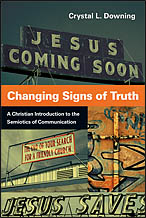
Life on the edge of the coin. That is Crystal L. Downing‘s image for the communicative task properly understood in Changing Signs of Truth: A Christian Introduction to the Semiotics of Communication (InterVarsity Press, 2012). We live in the tension (or on the edge) between that which we want to communicate and the one with whom we want to communicate. Downing develops this idea by introducing us to the use of signs in communication–the field of semiotics. Along the way, we meet de Saussure, Gramsci, Peirce, and Bakhtin and other major figures in this field of study.
The major purpose of this book is not simply to elaborate a theory of communication, however. It is to think about the significance of “signs” in the communication of Christian truth. Downing suggests for us the idea of living on the edge between resigning ourselves to the truths of orthodoxy and (re)signing ourselves and our communication in the 21st century world to connect with our contemporary culture. She thus argues for neither rigid adherence to the statements of Christian truth from the past, nor a capitulation in the attempt to be relevant, but rather the use of new signs to express the same truth. One example of this she gave from my own generation was the rise of a counter-cultural movement in the early 1970’s that recognized the establishment connotations of the sign “Christian” and adopted the name “Jesus People” instead, which appealed to hippies and others in the counter-culture of the time.
Changing Signs of Truth is probably the clearest introduction to many of the thinkers often labeled “post-modern.” And it indulges in some of the clever word-play one encounters in this literature (for example, using Bakhtin as a remedy for communicative diseases!). Yet this is always cleverness with a purpose. The only thing I would like to see Downing address more is how our efforts to “re-sign” can be tested for their faithfulness to the truth that is behind our whole tradition of signs.
————–
From the desk of the editor . . .

Living in South Central PA, I have enjoyed hearing Crystal Downing speak a number of times. She is the Distinguished Professor of English and Film Studies at Messiah College (PA). If you appreciate the work of Dorothy L. Sayers, I encourage you to to read Writing Performances: The Stages of Dorothy L. Sayers (Palgrave Macmillan). Writing Performances received the international Barbara Reynolds Award for best scholarship on Sayers. This award was granted at Cambridge in 2009 by the Dorothy L. Sayers Society. To God be the glory! ~ Thomas B. Grosh IV, Associate Director of ESN, editor of ESN’s blog and Facebook Wall.
————–
Note to the reader: The Emerging Scholars Network (ESN) continues to encourage those who have read the book “under review” to comment. In addition, we acknowledge that some who have not read the book “under review,” also bring helpful insights to the concepts/data explored in a given book, the writing of a particular author, and/or the understanding of the concepts/data as offered by the reviewer. As such we are open to “civil” on-topic comments from both those who have read and those who have not read the book “under review.”
Deep down ESN longs for reviews such as those offered by Bob not only to foster dialogue, but also to serve as teasers — providing an opportunity for our readers to discern what books to place in their personal and book discussion group queue. If you have books you desire to review and/or to have reviewed by ESN, please email ESN.
Bob Trube is Associate Director of Faculty Ministry and Director of the Emerging Scholars Network. He blogs on books regularly at bobonbooks.com. He resides in Columbus, Ohio, with Marilyn and enjoys reading, gardening, choral singing, and plein air painting.

Leave a Reply